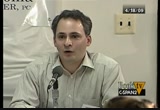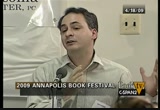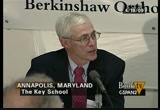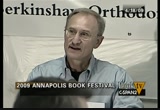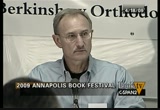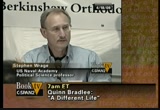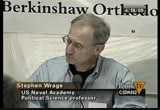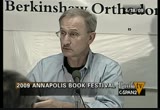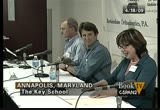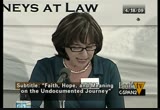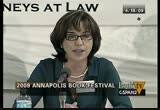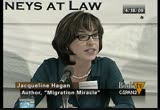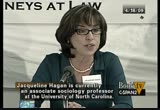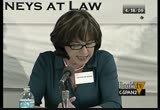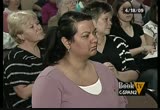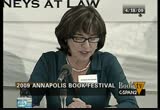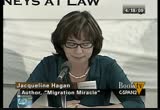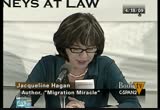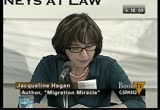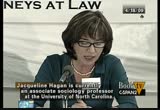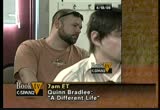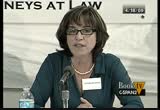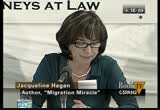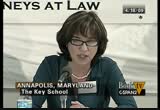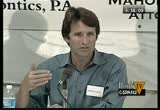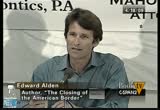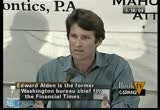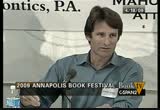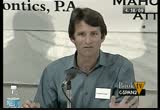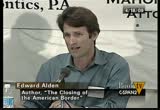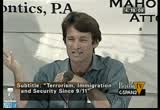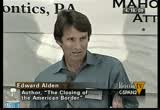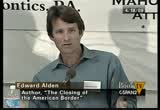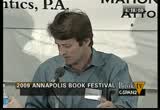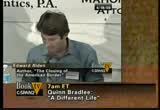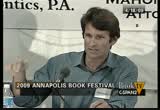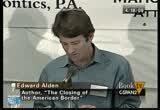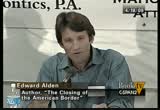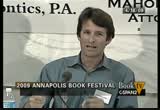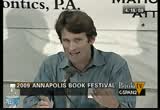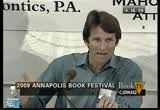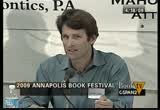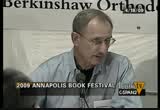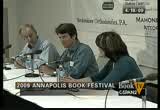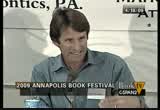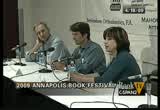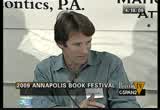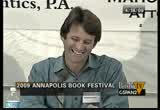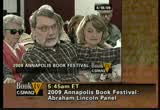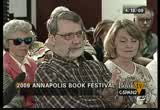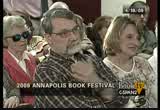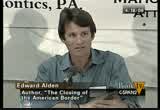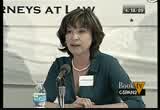tv Book TV CSPAN August 10, 2009 4:55am-5:50am EDT
4:55 am
definition of a complex human a system. of complex human systems have error rates and we need to be very candid about that. just as bombings all military use of force have air raids and we measure them in civilian casualties. it releases are also a complex human system that has the air rate and we should and often don't measure and a subsequent civilian death there have been a lot of people killed as a result of people that we have released and in retrospect we should not have released and we have done a lot of damage to people we should not have captured or detains. the basic contours' we have used so far back to the conversation we just had if
4:56 am
anybody is the enemy combatants within the war now the obama administration retain the substance but dropped the word enemy combatants does the authorization for the use of military force which representitive barbara lee voted against coming in for authorize the force contained by the act of detaining somebody? i argue parts of the enemy against which congress has authorized the use of force, that is the basic paradigm we have used to date. i would argue that is too loose and not a useful way of thinking about the category of people we want to detain and i would argue is there any different legislation of the category of the two tenable person. i can describe for you if your interested but it is more closely based, to some degree
4:57 am
on the notion or the standards of the foreign intelligence surveillance act and almost more than either of those individual dangerousness which we use of the context of mental illness to detain dangerous paranoid schizophrenics were people who pose a serious danger to themselves or other people. >> that will do it for our our progress hope you found this as enthralling as you did. i want to thank ben wittes, congresswoman barbara lee and charlie savage their books will be on sale i assume you will sign for a short time? thank you for being with us. [applause]
4:58 am
>> good afternoon. it's nice to see you all here today. >> are we on? >> i am. it's great to see you all here today. good afternoon. here at key school. i'm not surprised to see so many people in attendance for this conversation about migration and borders and policy and about the experience of the people who have dealt with the arduous journey to enter the united states, particularly from the countries to the south. this is, obviously, an issue of
4:59 am
great national importance, and i suppose it's what the president has been concentrating on most these last couple of days down in trinidad and tobago. i know the secretary of state has just been in mexico to talk about migration policy, and the president has just announced that after 50 years, to some degree at least, migration policy from cuba will be somewhat alleviated or revised, reformed. it was an irony i'm sure wasn't lost on many of the cubans that he made his announcement on the anniversary, the 48th anniversary to the day, of the bay bay of pigs invasion. he is so often compared to jfk, and yet this is one way, his policy towards cuba is, obviously, very different than jfk's policy towards cuba. he'd gotten a bit of a beating from morales and hugo chavez and daniel ortega on a lot of issues
5:00 am
having to do with migration and the borders, but on that one issue, ortega was willing to cut him some slack. he pointed out that it is the truth at the time of th%@úsñ north carolina in chapel hill who has been interviewing in compassionate and intimate detail the people who have made the journey, almost a pilgrimage as she recreates it from their words from places like the highlands of guatemala to places like maryland. and she is going to explore for
5:01 am
us their personal experiences and the function particularly that faith and their religious beliefs, the promise that they make in advance to a religious idol how these things sustain them, how the various groups, humanitarian, religious groups who can provide sanctuary for them, how these have been important factors in making their journey. her book is entitled, migration miracle: faith, hope, and meaning on the undocumented journey. she'll speak first, but let me say just a word about mr. ted alden whose book treats many of the same issues more from a top-down than a bottom-up way, but the two books compliment each other beautifully. he concerns himself with many of the policy issues, appropriate since he's a senior fellow at the council on foreign relations
5:02 am
and former washington bureau chief for the financial times. and he's written a beautifully-documented and investigated book based on many interviews with policymakers from the department of homeland security, from the state department, from immigration and naturalization, and he is able to recreate for us the ways that foreign policy and particularly migration policy have changed since the attacks on september 11. it's often been observed that if the migration laws had been carefully enforced, i think it's seven out of the attackers who carried out the 911 attacks would have been apprehended. instead, there were certain problems. i know that mohamed atta's letter that said he could have a visa to carry out his studies at a flight school in florida, his letter did come through to that
5:03 am
flight school. it arrived in february 2008, about five months after the attacks were complete. but there are some problems, apparently, with the enforcement of the law, is what i'm saying. mr. alden will recreate a lot of the policy debate, but also the impact of these laws and conclude whether we have been made more secure or effectively less. let me turn, however, to dr. jackie hagen then to talk to us about her book, migration miracle. >> good afternoon. i'd like to thank the organizers behind this wonderful event and today's participants and audience for providing me with the opportunity to present my book, migration miracle, which focuses on the role of religion in the migration journey. i'd like to begin with the experience of a mexican immigrant whose story is representative of hundreds that i've gathered. the first time cecilia traveled
5:04 am
to the united states from her hometown in mexico, she was 19 years of age. she made the journey with her husband, juan, and her sister, margo. before leaving on what they suspected would be a life-threatening journey, the women sought the blessing of their priest who told them to make the mexican people proud by becoming a good person in the united states. to work hard and to send money home to your parents. the day of the departure cecilia's mother lit candles to provide light in the darkness of their journey and placed the candles, along with flowers, next to a statue of the virgin of guadalupe on a homemade altar in the front room of their home. the departing trio then flew to tijuana where they were met at the airport by a friend and a trusted coyote. they then drove to an undisclosed area in the desert
5:05 am
joining a group of travelers and another coyote. strategically, the coyote separated the women and children from the men. the men headed out on foot towards the border, the women and children who were charged for additional protection, were crammed into the back of a sealed van. with tears in her eyes, cecilia recounted to me the horrors of the ride. we were squeezed into the back of a truck like sardines. there were more than a dozen of us women and children. we were suffocating from the heat. there were no windows, no ventilation. the driver said that immigration officials were following us, so we kept quiet, and we kept still, and we indoored the sweltering -- endured the sweltering heat. i prayed in silence to god and pleaded with him to let us live. after several hours the truck came to a sudden stop, and the driver opened the doors and
5:06 am
released the women to the blistering hot, but fresh desert air. the coyote gave them water and cookies and told them now they would wait for a second vehicle. suddenly, a group of dark suvs approached. when the coyote saw the vehicles, he quickly rounded up the women and children and rushed them to an area several hundred feet from where the suvs had stopped. we were told these were mafia and that they were smuggling drugs, and that they were very dangerous. you see, the coyote had rented the area from them. we were told to form a line, turn our backs to the trucks, and he then warned us if we dared to turn around and look, we would probably be shot. for several hours the women and children stood under the scorching sun. the women endured the ordeal through prayer. most of us had brought with us holy cards and very softly, through tears of fear, we
5:07 am
recited the prayers that were written on the back of the cards. the woman standing next to me dared to turn around and look at the man. she later told the rest of us that they were carrying bazookas. the coyotes finally guided the two women across the mexico/california border. ironically, cecilia's husband had arrived without incident and several hours before. the extra protection they purchased was no guarantee of a less dangerous journey. upon their reunion at the hotel, the three migrants got down on their knees and gave thanks to god and the virgin of guadalupe for their good fortune. cecilia then called her mother to let her know that they had arrived safely. when her mother heard the joyful news, she knelt before the home altar and also gave thanks. her vigil was over. she blew out the two candles she had lit to illuminate the path
5:08 am
to safety in the united states. each year thousands of unauthorized migrants come to the united states in search of work, and each year hundreds die along the way. most who attempt the dangerous crossing are poor laborers from mexico and central america who, like cecilia, usually have no recourse but to leave behind family and community. until now, scholars have explained their migration undertaking in economic and social terms alone reflecting in large part the type of questions social scientists have developed to understand and justify migration experiences. i, too, found that under questioning migrants were more often than not -- will more often than not cite some
5:09 am
confrontation of push/pull economic factors to explain why they migrated. and when i ask them why did you migrate to a particular city or town, they most often would tell me the choice was made because of friends and family who lived there. but when i asked them how did you manage to survive the hardships of the journey, nearly all of them answered, with god's help. my book, migration miracle, focuses on this unexplored dimension of the migration undertaking, the powerful influence of religion. drawing on five years of field work and 450 interviews with migrants, religious leaders and faith workers in central america, mexico, and the united states, migration miracle traces the ways in which religion and spirituality organize all stages of the migration process. from decision making and
5:10 am
departure through the journey to the arrival and beyond. now, religion does not explain why individuals migrate. but it is a powerful guiding strategy. it certainly shapes how they make their decisions and how they decide the timing of their departures. to prepare for leaving home and loved ones, more than three-quarters of the migrants in my study turned to religious practices such as pilgrimages to shrines, departure rituals in the homes, prayer, and trusted clergy to help them make the decision. and religious institutions and clergy in sending communities recognize emigration as a household survival strategy, and local churches embrace migration devotion as a means to keep their members close to them when abroad. blessings by trusted clergy also
5:11 am
provide religious sanction for the migration, a kind of spiritual travel permit that has huge symbolic value in most poor and marginalized communities. even when departing blessings fail to protect journeying migrants, their belief in them does not wave. one catholic priest told me of one occasion when a group of departing migrants approached him for a blessing. he complied with their request, but less than a week later they called to tell him they'd been apprehended, sent back to mexico, and now they wanted another blessing. so the group arrives at the shelter and the priest asks them, so, the blessing didn't help you that much, did it? why would you want another one? they responded with pure faith and conviction, father, forgive us if we contradict you, but
5:12 am
with that blessing we arrived as far as houston. without it, who knows? we probably wouldn't have made it as far as the border. now, religion cannot determine how and whether migrants make it to the united states, but as a powerful coping and mediating force religion often shapes the experiences on the journey. fortifying them with the will power to continue. the changing conditions today of the undocumented journey, especially militarized borders and the increased physical dangers they pose and the rise of a migration industry including smugglers and gangs that prey on migrants, have resulted in the growth of religious and humanitarian organizations that increasingly provide aid to transit migrants. once limited to occasional churches, now multiple organizations, churches, and migrant programs along the
5:13 am
migratory route have become part of the social infrastructure that sustains and advocates for the rights of migrants. at multiple levels of church hierarchy from the bishop's conference to interfaith organizations to local churches in central america, mexico, and along the u.s. border, faith workers are increasingly involved in issues of human rights and international and transit migration. motivated by a theology of migration, an advocacy for the rights of migrants to cross borders, to find work, these faith workers contest state activities and monitor the regulatory and enforcement practices of state policies. in this role they assume an important responsibility in the organization of undocumented migration, and they suggest the emergence of a new sanctuary movement in the region.
5:14 am
yet my grants are not always able to find sanctuary on the road. to help them with the loneliness, the despair, and the danger they often turn to their faith as a means of survival and as a way to find meaning in the journey. across nations over mountains and deserts, familiar religious practices provide spiritual sustenance. as one migrant told me, god was my constant companion. although i can't remember how many hours i spent in the desert, i can remember the number of rosaries i said. when feasible, journeying migrants turn to churches and shelters for help, but more often than not they practice their religion outside institutional walls. while some visit established shrines, others spontaneously erect their own shrines to revered saints from their ohm communities.
5:15 am
home communities. still others rely on images of their protecters pasted on holy cards or engraved on medallions vt from god. these migration miracles provide meaning and hope to migrants who believe that their trips have been sanctioned by god. they also propel and sustain action by providing migrants the psychological will to move forward.
5:16 am
migrants also believe himmals, rosary beads, crosses along the journey as markers of their undocumented identities. the topic of this session is immigration in the post-9/11 era, a period in which immigration is increasingly framed as a national security issue. and in the name of national security, the u.s. government has plowed billions of dollars into the militarization of our southwest boshedder to deter terrorists, traffickers and criminals. while our enforcement has done little to deter the entry of these and other migrant groups, it has imposed huge human cost on sincerely religious people desperate for work to support their families. ironically, characteristics found admirable by the majority of americans. yet despite the evidence of such
5:17 am
migrant stories of those in my book and of the hundreds of migrants who die each year in their attempt to reach the united states, academics, policymakers, and citizens alike continue to cast the immigration experience in terms that dehumanize these desperate people making it easier to attack and criminalize them, and, in fact, to see them as different from and not part of or like us. by exploring migrants' religious and cultural practices and by portraying the harsh realities of the journey and of their lives, i have sought to present a fuller, more recognizable human portrait of these humble strangers in our land. by all news accounts the obama administration is in the early stages of immigration reform. what can we learn by those most
5:18 am
atbected -- affected by immigration policy but least often heard? we can learn that any immigration reform package must be equitable and humane. it should include an intelligently-conceived guest worker program, stiff and enforced employer sanctions, a sensible and humane legalization path for immigrants that have established work and family ties in the united states, and a border enforcement policy that is evenly implemented across all our borders and does not treat all crossers as criminals and terrorists. as a nation we must strike a balance among law enforcement, societal benefits, and human rights. thank you. [applause] >> thank you, dr. hagen. we'll have good time for questions and discussion, but
5:19 am
first i'd like to ask mr. ted alden to tell us about his book, the closing of the american border: terrorism, immigration, and security since 911. >> thank you very much, steve, and thank you, jackie, and thank you for your book which is, which is very moving. the stories are quite compelling. and it's interesting, though, i think steve is right, my book is more of a top-down book. in a way i started in the same place which was with stories of migrants themselves. in my case less undocumented or in some cases documented my grants coming up from central america and mexico, but software engineers, foreign students, doctors, scientists and others who suddenly found they couldn't get into the country after 9/11, and i wrote many of these stories when i was working for the financial times. after i left, i wanted to understand what had happened to these individuals which is where my book started. so how could anyone write a book called the closing of the american border? i mean, don't you realize that
5:20 am
our borders are a sieve? that they are hopelessly porous? and if not, you're clearly not watching lou dobbs or bill o'reilly, and you'd better get on it. [laughter] the truth is 20 years ago i probably would have agreed with that assessment. even ten years ago, though we had begun to tighten up the border to deal largely with undocumented migrants coming up from mexico, that was still largely true. but it's not true anymore. since 9/11 we have been tightening our borders in the most radical and significant way in this country's history. the main accomplishment of the department of homeland security, indeed some might say the only accomplishment, has been to clamp down on the nation's borders. the good news is that it's a lot harder for terrorists and criminals to get here than it was before 9/11. the bad news is that it's also a lot harder for everyone else. and as a country we have scarcely begun a conversation
5:21 am
over whether that is a trade-off worth making. so what has changed? well, obviously, since i'm here i'm urging you to buy the book because i think it's a compelling story and one that really has been largely unrecognized. i tell a series of stories about individuals and go back and forth between the struggles inside the u.s. government over what to do after 9/11 and many of the individuals whose lives were turned upside down by the consequences of those actions. i had excellent access for interviews all the way up to colin powell and tom ridge, so i think there's some important research here. but i will try to put the story in capsule form by looking at before 9/11 and after 9/11 scenarios. let's start with visas. since every one of the hijackers came to the united states from countries where they needed visas to travel here, most of them from saudi arabia, the truth is that prior to 9/11 it was laughably easy to get a visa
5:22 am
to come to the united states. our policy, and it made sense in many respects, was that it was an unambiguously good thing to encourage people to come to this country. they came as foreign students, it was good for our universities, if they came here to do business, it was good for our economy, if they came as tourists, it was good for disneyland. [laughter] we nearly doubled the number of visas in the '90s for people to travel to the united states. the only thing we worried about was people who would stay here. well, the saudis were a great bet. as one former state department official put it to me, saudis didn't come and dig ditches, they didn't go to work at mcdonald's, they partied, and they left. [laughter] in retrospect, of course, that was an enormous mistake. by 2001 we certainly knew that al-qaeda wanted to attack us. they had done so overseas already with devastating effect,
5:23 am
and they had already bombed the world trade centers once in 1993, though they hadn't succeeded in bringing them down. the 9/11 commission later discovered that if we had looked carefully, there were indicators on the passports of a number of the hijackers that showed their connections to terrorist groups, we just didn't look very hard. so what's the situation now? well, if you need a visa to come to the united states now, it is mandatory that you have a face to face interview with a u.s. consular officer. we used to waive interviews frequently for travelers who were considered low risk. and again, low risk in this context meant somebody who was likely not to overstay, so most saudis weren't interviewed. you will now have is all ten fingerprints taken when you get your visa, and those are going to be compared -- you're going to give them again when you arrive at the airport in the united states to make sure you're the person on that visa. your name is automatically going to be checked against a terrorist watch list that now has roughly one million names on it.
5:24 am
i'd be delighted if someone would ask me how we ended up with a million names on the terrorist watch list, but i'm going to skirt over that for the moment. .. is going to have to check out as well, you're going to have to do your fingerprints to the airline before you leave and we will see whether that happens.
5:25 am
the airlines don't like that. the bottom line, it's a lot harder to get a visa to come to the u.s. than it used to be your t-cell levels particularly from other countries for about half of what they were prior two 9/11. let's turn now to what they call the b cell waiver countries feared most people come to the u.s. don't need a visa, they come from europe or japan and other countries we consider trustworthy and let them in. before 9/11 all you had to do was show up at the airport with your passport and get on the airplane and in december 2001 and a disturbed young man named richard reid tried to light his shoe on fire unfortunately failed because he had enough explosives to bring down the plan which is why we now take off her shoes at the airport, but what he brought home was another layer of the problem which as one white house official put it to make, there are bad people who come from
5:26 am
what we consider the countries. there are islamic radicals living in france and germany in these places so what have we done? in 2004 we began taking fingerprints from everybody coming from these countries, largely for identity reasons. we wanted to make sure that they were who they said they were. we demanded that the europeans adopt secure passports here they used to be in belgium and kept a blank passports and post offices and are rather easy to steal and we discover that in the case of afghanistan, sheafs of these a blank passports. beginning last year began taking 10 fingerprints and that has allowed the government to check these fingerprints against with the cali to fingerprints which are fingerprints pulled off of sites in afghanistan or iraq that we consider my have some association with terrorism. it matches up with a cave in triborough, we certainly want to
5:27 am
ask you. at the same time insisted that the europeans and over a great deal of information on passengers before anybody gets on an airplane. as of this january, your personal information details about where you bought the ticket, your passport, background information needs to be with the government before today's on the airplane unit it will serve before a couple of years but we run background checks before they ever get on the airplane. which deals with the richard reid problem your bottom line, a lot harder to get here from europe that used to be. what about canada? after all this is the world's longest undefended border as people on that side said. canada which i know quite well, and were up in vancouver though i am an american by birth the mechanic is even more ethnically diverse country than the u.s. and sadly and number of radical groups and in a hidden have found canada hospitable for
5:28 am
organizing and fund-raising. 9/11 hijackers didn't come from canada as still some believe and canadian officials it having to address this question twice a week, but there are others who have tried to get in the intent is to block the los angeles airport as a so-called millennium bombing and was stopped at the border on the west coast where i grew up so what have we done with canada? writer after 9/11 we pretty much shut down the border and for several weeks there were 15 our lineup is backing up into windsor and other places. there's an extraordinary volume of commercial and passenger traffic that goes back and forth across that border so what we tried to do is develop what are known as smart the border initiatives in which we can use information technology and other techniques to separate out high risk for low risk travelers so if you're the guy in the truck driving a shipment of autoparts from the assembly plant, from the parts plant in ontario to the one in michigan, will you come across everyday with
5:29 am
special arrangements to make sure you get too easily and other people we don't know we try to check in more detail. we've made some progress on that but there remain a fundamental problem. canadians and americans have long cross that border with nothing other than a driver's license and, indeed, for many years if you are an american all you have to do is declare you are an american citizen and were allowed back into the u.s.. welcome in the eyes of dhs post 9/11 the drivers' license was and is secure document. far too easy to defraud so and the beginning of june this year everyone crossing the border into u.s. including american citizens is going to need either a passport or special secure document you're and there are developing enhanced drivers licenses which have fingerprints embedded in them but only a couple states have developed them your most americans don't have passports particularly those who are close to the border in the north, these are not big international travelers. canadians are further along and gç,ñ6t,ñpñgç,ñ,ñ
5:30 am
5:31 am
u.s.. we have already done a fair bit of tightening on the southern border in the 1990's in an effort to keep out illegal immigrants particularly as a result of rising complaints from the border states like california and arizona about to the cost of educating and providing services to on/off rest migrants and their children. under operation gatekeeper the number of border patrol agents tripled from 201990 to 9,000 of the end of the decade collins. immediately after 9/11 however there wasn't an awful lot of focus on mexico and for an obvious reason, sometimes you'll see stories about a hezbollah presence in mexico, the radical lebanese group. but no one thinks mexico is a particular like the river terraced into the u.s., no documented case of the mexican government has an enormous interest in keeping terrorists out of mexico and making sure the border isn't used as a rich because we would shut down the
5:32 am
border and they know it. they cooperate with us very closely in providing information on people coming from abroad in mexico. yet ironically it is mexico and mexicans that have probably been the biggest price for the 9/11 attacks you're repoire 9/11 president bush and mexican president box were trying to negotiate migration package that might have provided some better ways for the two countries to cooperate in dealing with illegal immigration. those fell apart immediately after the attacks and as i tell in detail in my book immigration enforcement became the weapon of choice for the justice department, the fbi later dhs to try to do with the possibility that the next wave of terrorist attacks might come from abroad or they might be inside the u.s.. in the 1990's to give a comparison, on which taught an illegal immigrant in the u.s. the standard practice was to set a court date so they would be allowed to appeal not to be
5:33 am
deported. and a lot of cases there are a lot of people. a gray area with some legal claim to stay and we have courts that are supposed to adjudicate that so if you got caught an official said we thank you are here illegally will set a court date three months from now, not surprising in the '90s they disappeared back in the country so after the 9/11 because we were worried that one of those no-shows' might turn out to be a terrorist we ended in this policy which was known as catch and release. so now if you are an illegal and you get caught you will be jailed until you're hearing unless you volunteer to leave before that. that can mean many months in jail, often hundreds of miles away from your family because you put you -- it is or is convenient, not easy for you. on any given day we have about 30,000 such people in jail around the u.s.. and we are reporting close to 350,000 people each year. a considerable portion of those
5:34 am
mexicans emeritus similarly before 9/11 immigration enforcement was solely a federal responsibility. i will tell the story quickly because i don't have a lot of time, but on the night before 9/11 the hijacker was the pilot of a united flight that crashed in pennsylvania, he essentially pulled over by a traffic cop killing 95 miles per hour on highway 95 headed north two new york and they ran the usual warrants and nothing came up but a ticket for two and $7 was written and it was found in his luggage after the attacks. what people in the justice department took away from that was it that traffic cop and had access to a database of who was in the country legally and was not because at the time even though he had entered illegally he was actually an illegal immigrant and overstayed his visa and attended fi school of thought is to be cecil he was a double by letter so if the had a database that could have pulled him aside, held onto him and maybe the 9/11 attack wouldn't
5:35 am
have happened. what we have done since 9/11 is to get a lot more local police forces involved aggressively in immigration enforcement. perhaps i have caught another man, i haven't seen evidence but they have certainly, a lot of ordinary illegal migrants to get pulled over because there taillight is busted. again, an awful lot of those are mexican. and as the debate heated up in 2005 and 2006 the bush administration got really serious about the southern border. we have added border patrol troops so fast that we are now nearing the 20,000 mark, dublin really in the last four years making it by far the largest law enforcement in this country. congress passed a law requiring a 700 miles of double fencing on the border and we are close to completion of that. at a cost of $50 billion over the next 25 years here and i was outraged when i wrote that but i
5:36 am
suppose that is chump change these days considering the money we are spending with a stimulus. [laughter] we are spending similar buildings with borders of sensors and drowns. as one province official put it to me talking about the progress and made, in the history of the world nobody has ever secure borders before. it's never worked. the great wall of china did not work, and we are trying to do it. there might be succeeding, apprehension rates along the border which is a way we measure the people crossing have fallen to their lowest level since the mid-1970's. most of that is there are no jobs because our economy has collapsed the there is no question that the enforcement measure has had an impact. bottom line, it is a lot harder to get here from mexico and if you really know it is hard to stay so to conclude -- eight years after 9/11 i am here telling you that i am right and lou dobbs is wrong. we are closing our borders. the question remains is this a
5:37 am
good thing? and ibook i tried to focus very much on the story and to explain why these things were done, often to the eyes of the government officials and mideast decisions. these are hard choices made in a time of national trauma and i think many of the worst consequences were unintended once but is also pretty clear that i am dismayed by much of what has transpired. and there is no question that we needed to do more to secure ourselves against terrorism and border security needed to be part of that. we were dangerously and irresponsibly liheap before 9/11. a but we're also a nation of immigrants, built by people who came here from across the world embraced a new set of values and created a strong and vibrant country you're in and we have not done in very good job of trying to distinguish between a tiny handful of people who are coming here to harm us and the overwhelming mass majority will come here to build better lives for themselves and in doing so
5:38 am
are building the future of this country. thank you very much. [applause] >> i thought i would offer a question and then solicit from all of you, but wouldn't it be a whole lot easier if i am someone ready to invest and create jobs in software development for example and i have trouble bringing in my workers from india or pakistan or singapore or britain? would it be a lot easier for me to move the job to the worker overseas and bring the workers to the job here? >> i had a conversation about three weeks ago with a google executive who is responsible for these decisions, director of global hiring. he says we hire and we locate our facilities wherever we can bring in the till to people we need. he said that at this point they think they basically interviewed everyone in the state of california.
5:39 am
google searches the entire country and the entire world to find the best people and he said because it's hard to get the people in the u.s., we will locate in hong kong or singapore or europe and we're seeing microsoft for the first and has moved a research and development facility outside into vancouver because it's easier for them to get the people that want in canada. that is what companies will do. they can get them here they will go elsewhere. >> jackie, does it make sense to say that the mexican people are the ones that suffered the most of 9/11? >> i would agree. from my story through my research yes of mexicans essential -- central americans have paid the price of are very confused by it. i just returned from mexico an indefinite number of the few interviews for a different project and it was really heartwarming chondroitin -- for people who have returned for economic reasons because this so difficult to find work.
5:40 am
what great feeling they still held in the american people. it is just so shocking and they don't understand what happened in the government and the last year. again recanting exactly what you have said, we knew nothing about this terrorism and we have nothing to do with it. i thought this was other countries and all want to do is come and work. so yes i do believe that they pay the price. >> i heard similar stories from people who had been horribly abused -- these are excellent legal currency fell afoul of the terrorism's. one guy who was handcuffed and spent three months in jail in texas and removed from his wife and deported back to lebanon your approval staff and i hear the same thing, we love the united states, all we want to do is come back. the amount of good will we still have in the world despite the mistakes we have made is really astonishing and we need to build on that. >> walls and of the civil and i think of the great wall of china, they seem to be
5:41 am
self-defeating, the berlin wall, the national line, a wall or fence in israel and a huge one of our selfless border. is there anything good to be sent for fences? >> it separates neighbors. employment. >> the robert frost principal. >> the only area that bentsen makes sense at all supported here is that in urban areas. and the reason being that in the san diego tijuana area it was possible for people to run across the border and disappear into the san diego suburbs and five minutes in the border patrol didn't have the slightest chance of stopping and it was dangerous. it would run across the freeway is but the problem is and i thank you push people further in the desert which in his own way is even more dangerous. so i support and some very limited ways but what we're doing now is far beyond anything that makes sense from irrational
5:42 am
enforcement perspective. >> deaths have increased with enforcement efforts and much of it has to do with the fact that my friends have historic leap crossed establish urban areas and towns where they had friends and family and where they would return, but now i have been deflected into these areas and exposed to the harsh extreme elements in the number of deaths have gone up. and the causes of death so it might not be automobile accidents but it might be hyperthermia or starvation. >> 1c is a sad kalin even shaped yellow signs and san diego pitcher in a family planning across the highway trying to hold a child by the hand. i'm trying to make a case and i don't know if i believe it but as the devil's advocate, what if more fences were better than two offenses and that a fence at least allows the people who are being fenced in or fenced out to calculate their arrest and may deter people if they know that
5:43 am
there isn't going to be a favorable outcome? with the save lives ultimately? >> it hasn't. the buildup of enforcement is actually increased lives so i don't think it is a deterrent. >> the problem is one open she like ours it is hard to build a fence big enough our current secretary of, security said you can build a 15-foot fence people will build a 16-foot ladder or tunnel under, or in you're opening anecdote and they will back 100 people in the back of a cargo truck. and let them suffocate as they try to drive to the legal ports of entry. there are always going to be ways to get into this country. we are a big open country. >> and the story of tunneling and a stream efforts people like perot is inspirational but also ultimately distressing. questions from the group please?
5:44 am
>> i have two questions, i can probably take up the whole day. [laughter] because i have a rather negative feeling about what i've just heard. my first question is, certain i am very interested in the question of how you get on that list because i was on and it. everybody look. [laughter] so i am very interested how you get on that, it was difficult getting off of it. the second thing is and there are two aspects of this, one has to do with immigration and the other has to do with cost. with immigration both of you talk about immigration just before 9/11 and an 9/11. you said, that we arenú@úlelestt
5:45 am
5:46 am
the second issue is cost. you mention specifically cotton -- specifically a about a million, and you were horrified by that, and the current thing in mind. nowhere have i ever heard anybody in this whole discussion over the past five years spent a lot of time when i talk like you to and talk about the cost to communities who aren't paying the bills for illegal immigrants and what cost that illegal immigrant -- immigration in places on the whole infrastructure. nobody ever talks about that and
5:47 am
compares it to the cost of the thames to have emigration to be legal. nobody is against that i am aware of legal immigration. >> can we answer? quickly on each point, terrace will watch list, you are presumably on it because your name was like someone else is on the list. there is a lot of name confusion. any fbi agent for any reason can stick a name on the watch list your people with common name. and my brother-in-law is a david anderson. he is still on the list and can get off, there is an i.r.a. die so that is why your honor to appear to the question of the history. the question is to look at mexico, it wasn't until the 30's we have any rules, they came in freely and went back and forth across the border whenever they wanted. the famous ellis island stories, you needed to get to ellis island which was an easy but once you got here you were in so the rules that we are talking
5:48 am
about are actually relatively modern, that's not to minimize their importance. i don't favor illegal immigration. i think illegal immigration is a bad thing for this country in a lot of different respects but the reason it happens is that we have got a system that doesn't begin to reflect the demand that our economy has for people coming in to do all of the jobs that illegal migrants do. our annual quota for unskilled labor and of illegal immigrants system if you don't have a family tie test 10,000 people people so i want to see reform of the system so that we allow people in in something like the numbers that reflect the demand for our economy normally. right now we're in a horrible recession but normally. and you have tough sanctions on employers who sired people illegally because they abuse them. lowell. >> controlling and regulating
5:49 am
migration, but clearly recognizing that there is a demand for labor and it can be regulated and can be temporary. and it is an avenue really haven't even explored or given time to think about. so i think maybe and in the obama administration perhaps he will organize a select commission. i thing is about time that you bring in all the stakeholders, employers, not just congress people, employers, migrants and the unions, anybody that might have a stake in the situation and discuss it now. and have a bipartisan, but i can all the players that would be affected by this. i guess being told to wind down. >> we've got about five minutes. >> by want to add in a question at a great point that there are great cost on the committee and education and health
174 Views
IN COLLECTIONS
CSPAN2 Television Archive
Television Archive  Television Archive News Search Service
Television Archive News Search Service 
Uploaded by TV Archive on

 Live Music Archive
Live Music Archive Librivox Free Audio
Librivox Free Audio Metropolitan Museum
Metropolitan Museum Cleveland Museum of Art
Cleveland Museum of Art Internet Arcade
Internet Arcade Console Living Room
Console Living Room Books to Borrow
Books to Borrow Open Library
Open Library TV News
TV News Understanding 9/11
Understanding 9/11